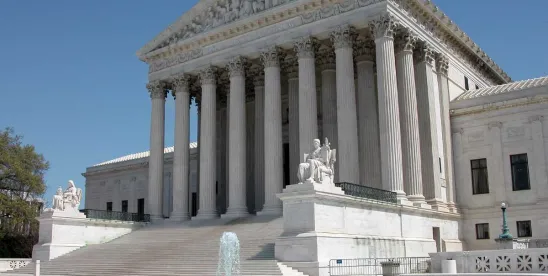On May 23, the Supreme Court issued a decision holding that when parties have two conflicting contracts – one that sends disputes to arbitration and one that sends disputes to the courts – a court, not an arbitrator, must decide which contract controls. This decision is important as arbitration provisions continue to rise in popularity and situations like the one the Supreme Court encountered are not uncommon.
The Supreme Court’s decision in Coinbase Inc., v. Suski, et. al., stems from a dispute regarding two separate contracts between Coinbase, a leading cryptocurrency exchange platform, and respondents, users of Coinbase. The first contract concerned the Coinbase user agreement, which included an arbitration agreement with a delegation clause. The delegation clause provided that “[a]ll such matters shall be decided by an arbitrator and not by a court or judge.” The second contract concerned the official rules of a sweepstakes Coinbase offered, where respondents entered for a chance to win Dogecoin. The official rules contained a forum selection clause, which provided: “[t]he California courts (state and federal) shall have sole jurisdiction of any controversies regarding the [sweepstakes] promotion and the laws of California shall govern the promotion.” Thus, the arbitration agreement’s delegation clause, which sent all disputes to arbitration, and the official rules’ forum selection clause, which sent all disputes to California courts, provided for different procedural vehicles for disputes.
Respondents brought suit against Coinbase in the United States District Court for the Northern District of California for claims under the Coinbase user agreement and the official rules. Coinbase moved to compel arbitration based on the Coinbase user agreement, and the District Court denied the motion, reasoning that deciding which contract governed was a question for the court. On appeal, the Ninth Circuit affirmed the District Court’s ruling. The Supreme Court then granted certiorari, and was tasked to decide, when two such contracts exist, who should decide the arbitrability of a contract-related dispute between the parties – an arbitrator or the court?
Justice Ketanji Brown Jackson, writing for the Supreme Court, began the Court’s analysis by noting that the Supreme Court has “previously addressed three layers of arbitration disputes: (1) merits, (2) arbitrability, and (3) who decides arbitrability. This case involves a fourth: What happens if parties have multiple agreements that conflict as to the third-order question of who decides arbitrability?”. Justice Jackson wrote that “[b]asic legal principles establish the answer. Arbitration is a matter of contract and consent, and we have long held that disputes are subject to arbitration if, and only if, the parties actually agreed to arbitrate those disputes. Here... a court needs to decide what the parties have agreed to.” So, if there is a contract at dispute without an arbitration clause, even if there is another contract that requires arbitration, the matter will need to be decided by a court.
Coinbase argued that the user agreement’s delegation provision should have been isolated and severed from the contract and the Ninth Circuit should have considered only arguments specific to that provision. The Supreme Court, however, rejected this argument, reasoning that if a party challenges the validity of the precise agreement to arbitrate at issue, the federal court must consider the challenge before ordering compliance with that arbitration agreement. The Supreme Court also declined to heed Coinbase’s warning that its ruling would “invite chaos by facilitating challenges to delegation clauses.” To this argument, the Supreme Court replied that such chaos will not follow because disputes with one contract that mandates arbitration will go to arbitration absent a successful challenge, and situations with two contracts – one sending the dispute to arbitration and one sending the dispute to the courts – will be handled by a court.
This is an important decision in the dispute resolution space because it makes clear that even though a company may have an arbitration provision in one contract, that arbitration provision will not necessarily carry the day if there are subsequent contracts that provide for different results. As companies continue to increasingly use arbitration provisions in their contracts, they must be careful to be consistent in any future contracts or agreements.






 />i
/>i

